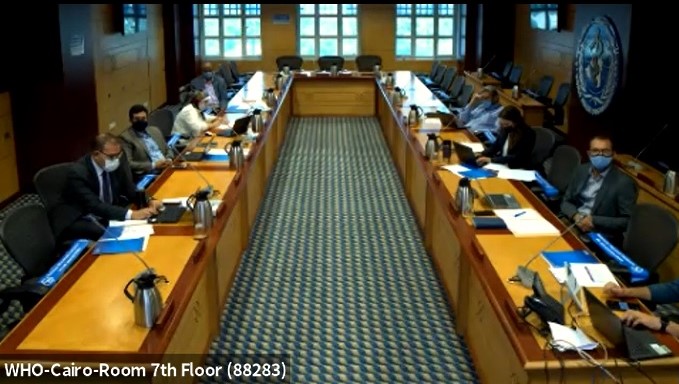 Cairo, 2 August 2021 – Working on pandemic influenza preparedness (PIP) during the COVID-19 pandemic has proven to be challenging for priority countries in the Eastern Mediterranean Region, but WHO has been supporting these countries to address challenges in ensuring effective implementation of the PIP framework.
Cairo, 2 August 2021 – Working on pandemic influenza preparedness (PIP) during the COVID-19 pandemic has proven to be challenging for priority countries in the Eastern Mediterranean Region, but WHO has been supporting these countries to address challenges in ensuring effective implementation of the PIP framework.
This was the outcome of a country focal points meeting held virtually on 7 July 2021. The annual PIP coordination meeting was organized by the Infectious Hazard Prevention and Preparedness (IHP) unit of the WHO Health Emergencies Programme at the WHO Regional Office for the Eastern Mediterranean to identify common challenges, and potential solutions, particularly in the context of the ongoing COVID-19 pandemic. Participants from ministries of health of 10 countries attended the meeting, namely Afghanistan, Egypt, Iraq, Jordan, Lebanon, Morocco, Somalia, Sudan, Syrian Arab Republic and Yemen. WHO and PIP teams from the Regional Office, country office, and headquarters also participated.
During the meeting, participants from the PIP-supported countries identified some challenges faced during the COVID-19 pandemic and potential solutions that will better support the implementation plans of the PIP framework. Some of the common challenges identified included: the prioritization of COVID-19 over influenza and other diseases; the burden imposed on the systems; the deficiency in staff and laboratory infrastructure; low utilization of PIP funds; and the delays in shipment and procurement of influenza supplies due to COVID-19 restrictions. Increasing political commitment towards influenza and other diseases and motivation of staff were identified as main potential solutions to these challenges, while WHO will facilitate the procurement and shipment processes to the countries and provide technical support as needed.
An update of 2 main tools that will increase consistent and timely influenza reporting was introduced. The second version of the EMFLU network portal that will provide more advanced features on data management and analysis was presented, while GISRS+ will provide an opportunity to complement and build on the success of existing infrastructure with the addition of other respiratory viruses with epidemic and pandemic potential along with the integration of laboratory and surveillance capabilities. The PIP team from WHO headquarters presented updates from global PIP Partnership Contribution Preparedness High-Level Implementation Plan II (HLIP II) for the years 2018–2023.
By the end of the meeting, the IHP team and the attendees agreed on the way forward to improve PIP implementation by bringing back the attention to influenza and other respiratory diseases. The team also emphasized the importance of utilizing the capacities and resources that were leveraged for COVID-19 to enhance preparedness and response to influenza and other respiratory pathogens. It was agreed that countries should progressively adopt WHO technical guidance into their work modalities and make the best use of the partnerships that were established during this pandemic. Finally, it was highlighted that the exchange and documentation of experiences and learning is key to improving performance and will be our legacy to future epidemiologists.


